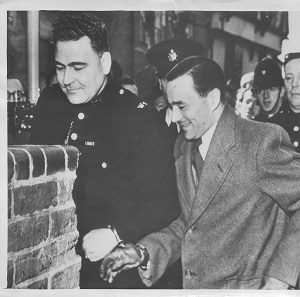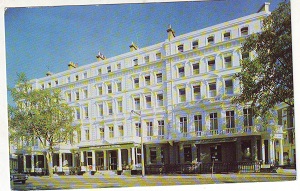Dr Jonathan Oates' new book about a serial killer and his victims
|
Imagine this. You are staying in a hotel in London as a permanent guest. Although flying bombs and V2 rockets are raining down on London – this being the autumn of 1944 – and despite the more mundane difficulties of rationing, petrol and clothing restrictions, life isn’t too bad.
Then one day a new guest arrives. He isn’t like the majority of guests. He’s male for a start and is young; a mere 35 years old. What strikes one immediately about him is how neat his appearance is. His shoes always shine and his black hair and neat little moustache is always glossy. He’s perhaps a little on the short size, about five feet six inches, but he’s always ready to smile and reveal his flawless white teeth. His clothing is immaculate, too. As one got to see him about the place, it was obvious that he had at least a dozen well made suits. He often wore a garment; perhaps socks or his tie, that was red. And he clearly had money; the hotel charges £5 5s per week plus a ten per cent service charge.
Now it might seem to the suspicious that he is a spiv, one of those black market merchants who knows how to make a quick profit certainly, but is socially uncouth and has little knowledge of the higher things in life. He’ll stay in the hotel for a few days or weeks and then scarper, dodging the hotel bills, no doubt, even though Miss Robbie, the manageress, is sharp enough.
Well, my sceptical friend, you would be mistaken. He drinks but little. Some wine with dinner and a sherry beforehand, but never to excess and never beer. He doesn’t smoke much. He never swears or speaks loudly, he never turns up at odd hours having been to a night club. And he never loses his temper. Even when he accidentally knocked a woman wrist, spilling her drink and then having her stub out her cigarette on his hand, he was perfectly calm.
He is always at ease with all he meets, both staff and fellow guests. He can talk about many subjects. Classical music for one, and especially works by Tchaikovsky, Chopin and Mozart. He’s a good performer on the piano, too. He can discuss the Bible and religious topics and is always free with quotations from Ecclesiastes. Not that he’s a church goer, or tries to force his views on others. He can talk about engineering and various projects he’s working on.
You see, he’s an engineer by profession. The Liason Officer of Union Group Engineering, who used to operate from Eccleston Square. You know of them? No? Well, never mind. The place was bombed in the war, so the emergency war headquarters had to shift. They have branches all over the south of England, in Crawley, Horsham, Putney, places like that. Not that our new friend needs to soil his hands, which are, like the rest of his appearance, always spotless.
All this explains why he isn’t serving his country in His Majesty’s forces, as all young and healthy men should be. He’s working on a number of patents which will enable the war to be won sooner than otherwise, and that’s no bad thing. In any case, during the Blitz he was employed in fire watching down Victoria way.
Well, all this is very good, but where is he from? Who are his people and where was he educated? He doesn’t like to bore people too much with his autobiography, but he’s let a few things slip out into casual conversation over meals. He was born in Yorkshire, his father was a colliery manager and he was brought up in his parents’ faith, as a Plymouth Brethren. It had been a strict boyhood, having to follow the rules of the ‘Peculiar People’. But he had had a good education, attending Wakefield Grammar School and then taking a BsC degree at Leeds University.
Our friend often goes out to meet his friends. There was a young chap called McSwan, rather like him in some ways, and they often went to the Goat pub on the High Street. He went away after a while, though. I think it was Africa or was it America? Well, he was never mentioned again. Then there was that couple, Dr and Mrs Henderson. A smart pair, indeed, and from the same social strata as McSwan. They didn’t stay around too long and went to South Africa, I gather. However, their, and surely our, friend looked after their dog Pat for some time.
The one constant friend of his, who sometimes comes for tea – but never stays overnight of course – or even goes up to his room (no woman ever does) is Miss Stephens. Unkind people have mentioned that she’s half his age, but as he’s the perfect gentleman, that can never be an issue. He’s so attentive to her, advising her on her dress, her hair and make up, before taking her out to a concert at the Wigmore Hall, the Albert Hall or to the ballet, before escorting her parents’ home in Crawley. A delightful girl and a perfect couple.
I should add that he’s been seen with other young women in the evenings when he’s not seeing his young friend. Nothing wrong in that; his girl has a regular 9-5 office job and lives in Crawley, as I have said. He also writes each week to his parents in Leeds. Such a good boy.
Now I gather you have a little money to invest, and could do with a little extra income in these difficult times. I think John, that’s his name, would be more than happy to show you one of his new inventions down at his workshop in Crawley. He can drive you down in his Alvis sports car, you can see his plans there, perhaps have a quick bite to eat at The George there, and be back at the Onslow for a late dinner. Ready to accept the offer?
Had you done so, as did Mrs Henrietta Helen Olivia Robarts Durand-Deacon, aged 68 and awidow living at the hotel, you would never have left Crawley, alive or dead. The workshop is only a scruffy shed in a back street, in a yard full of rubbish. You would be shot, your body stripped of any valuables and tipped into a drum. He would then transfer acid there to dissolve your corpse, returning a few days later to throw what was left among the rubbish in the yard. There won’t even be a grave stone to mark your grave. You have ceased to exist because your killer, who has done this five times before, believes that if there’s no body a charge of murder cannot be made.
John was John George Haigh, the acid bath murderer and alleged vampire who killed for money, but also a plausible and attractive man who was able to convince several people that he was their true friend. He was also a liar; who never attended university, wasn’t a leading light in anon-existent engineering company and had a substantial record for theft and forgery, as well as having abandoned his wife and baby daughter.
Read more about Haigh and those six people he slew – one being a former suffragette, another a homosexual with a criminal record, another was a man accused of murder, abortion, flagellation and drug dealing – in Dr Oates’ new book, John George Haigh: The acid Bath Murderer. A Portrait of a serial killer and his victims. This is the first book on the topic to be written with the benefit of police, prison and Home Office papers once closed to researchers.
Ealing archivist Dr Jonathan Oates will be giving a talk at Ealing Library on 20 November at 6.15pm on the topic of his new book, John George Haigh Acid Bath murderer: Portrait of a serial killer and his victims, tickets costing £4.
12th November 2014

